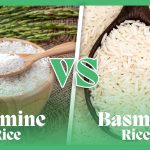In the conscious world of health and wellness, a fresh glass of fruit juice with all its mighty nutrients remains an emblem of a healthy life. Among the flavorful and refreshing layers of the fruits lie landscapes of vital nutrients that add to their nutritional richness.
Fruit juices are beverages made by extracting or pressing the fruits to bring out their natural juice. They are abundant sources of vitamins and minerals, plant bioactive, and free sugars. In this article, we explore the many nutrients found in different fruit juices along with their health benefits to the body. Join us as we squeeze out all the health benefits of these tantalizing fruit juices and put them in front of you!
Citrus juices:
Citrus juices are flavorful and refreshing drinks packed with various essential nutrients. They provide a balance of water and micronutrients along with other health-providing nutrients like phytochemicals.

Some of them are discussed below:
Vitamin C:
Owing to their high vitamin C content, citrus juices boost the immune system, wound healing, and collagen production. According to the dietary guidelines for Americans in 2010, vitamin C was recognized as the shortfall nutrient, meaning one portion of the U.S. population does not consume the required amount of this nutrient. So, adding citrus juices can be a great way to fulfill the recommended amount of vitamin C.
Vitamin A:
Vitamin A is abundant in grapefruit juice helps improve vision and skin, and may boost the immune system.
Folate:
Present abundantly in citrus juices, folate (vitamin B9) aids in cell division and DNA production, particularly during pregnancy.
Potassium:
Potassium in citrus juices may help regulate blood pressure, fluid balance, and nerve functions.
Natural sugars:
Citrus juices are a quick energy source due to the presence of natural sugars like glucose, fructose, and sucrose.
Dietary fiber:
While not as high as in whole fruits, citrus juices provide some dietary fiber that may aid overall digestive health.
Other micronutrients:
Other micronutrients in citrus juices are calcium, phosphorus, magnesium, and antioxidants that carry out essential functions in the body.
Orange juice:
Aside from being a refreshing and delicious beverage, every sip of orange juice is packed with essential minerals including vitamins, minerals, antioxidants, and phytochemicals rendering it a perfect breakfast option or a day drink.
One of the most prominent nutrients in orange juice is vitamin C. One serving of orange juice fulfills the daily recommended amount of vitamin C. Vitamin C improves function and prevents illnesses and infections. Furthermore, the electrolyte mineral potassium in orange juice regulates blood pressure, prevents heart disease, and regulates muscle and nerve function. Folate in orange juice helps in cell divisions and ensures healthy pregnancy by preventing birth defects. The antioxidant activity protects against cell damage by neutralizing free radicals and reducing the risk of chronic disease development.
While orange juice offers tons of health benefits, it is essential to consume them in moderation as excess intake may contribute to weight gain and a spike in blood glucose due to their sugar content even if natural. The acidic nature of orange juice may cause erosion in tooth enamel or gastrointestinal problems like acid reflux. What’s more, some people may be allergic to citric juices and experience itching, hives, or swelling. The best way to consume orange juice is to opt for freshly squeezed and minimally processed juice to reduce the sugar content and keep portion control under check.
In conclusion, orange juice is not just a refreshing drink, but rather a reservoir of nutrients that highly contribute to a healthy diet and lifestyle. Incorporating it into your everyday life as a part of a balanced diet is the way to achieve its maximum health benefits.

Grapefruit juice:
The colorful and tangy glass of grapefruit juice is a nutritional fountain that contributes to various health benefits to the body. It is an abundant source of vitamin C, vitamin A, potassium, fiber, and antioxidants that play their specific roles in the body for maintaining optimum health. The vitamin C in grapefruit juice boosts the immune system while the vitamin A maintains eye and skin health. The potassium in citrus juices reduces blood pressure and prevents cardiovascular diseases. Furthermore, dietary fiber helps improve digestive health by promoting satiety and stool health. The low calorie and high fiber content of grapefruit juice makes it a filling drink thus aiding in weight management. The abundant antioxidants in grapefruit juice like flavonoids, limonoids, and beta carotene, prevent oxidative stress by neutralizing free radicals.
While no major side effects have been observed in the consumption of grapefruit juice, however, it may interact with certain medications causing increased blood pressure, so consulting with your healthcare provider is essential. Moreover, some people may experience allergy symptoms upon consuming grapefruit juice.
Overall, grapefruit juice is not just a refreshing beverage but a nutrition powerhouse that provides tons of health benefits upon its addition as a part of a balanced diet.

Lemon juice:
Lemon juice is not only a zesty and flavorful addition to your meals but is also a nutrient galore and imparts various health effects to the body. A serving of lemon juice fulfills about 20% of your recommended daily intake of vitamin C strengthens the immune system and aids in wound healing. The potassium content of lemon juice lowers blood pressure, thus beneficial for heart health and nerve and muscle functioning. Furthermore, the citric acid content in lemon juice activates the digestive enzymes and boosts digestion while the antioxidants prevent cell damage. Lemon juice is widely known to be beneficial for skin health owing to its high vitamin C and antioxidant content.
Despite its numerous health benefits, lemon juice consumption poses some side effects. The high acidic content of lemon juice leads to tooth enamel erosion over time leading to tooth decay. Another side effect of consuming lemon juice is it may worsen the symptoms of acid reflux in people suffering from gastrointestinal reflux disease (GERD).
The ideal approach to consuming lemon juice and enjoying its benefits to the fullest is to dilute it with water to minimize tooth erosion. Incorporating it into savory dishes, desserts, dressings, and sauces is another effective way to enjoy its taste and benefits. However, the best way to consume lemon juice is by enjoying it in beverages like lemonade, cocktails, iced teas, etc.
In summary, consuming lemon juice in moderation is an excellent way to reap all its health benefits and add it as a part of our daily routine.

Tangerine juice:
Tangerines are similar in appearance to oranges but are small and easy to peel. These sweet and tangy flavored fruits make a flavorful and nutritious glass of fresh juice. A cup of tangerine juice renders natural sugars, dietary fibers, vitamin C, vitamin A, potassium, and dietary fiber.
Vitamin C strengthens the immune system while vitamin A aids in skin health by reducing signs of aging and wrinkles and protecting against UV damage. The potassium in tangerine juice may lower blood pressure and promote heart health and the dietary fiber promotes digestive health.
Moreover, the vitamin C and other antioxidants in tangerines may promote brain health and prevent schizophrenia, Alzheimer’s disease, and Parkinson’s disease.

Stone fruit juices:
Stone fruit juices are drinks made from the flesh of the fruits with a large and hard pit inside. Some of the fruits included in this category are peaches, plums, apricots, cherries, and nectarines. These fruit juices incorporate a plethora of health benefits necessary for the optimal functioning of human beings. Let us discuss some major nutrients in stone fruit juices and their health benefits:
Vitamin C:
Stone fruit juices especially peaches and cherries are rich in vitamin C, build the immune system that helps protect the body against infections and illnesses.
Vitamin A:
Apricot and peach beverages have a substantial amount of the precursor of vitamin A; beta-carotene, that provides healthy vision and improves skin health.
Potassium:
Stone fruit juices are ample sources of potassium that help regulate blood pressure and reduce the risk of cardiovascular diseases.
Dietary fiber:
Although lesser in amounts than whole fruits, stone fruit juices still contain some dietary fiber essential for better digestive health.
Antioxidants:
Stone fruit juices are good sources of antioxidants including flavonoids, phenolic compounds, and anthocyanins that help reduce oxidative stress, inflammation, and risk of major chronic diseases.
Following the major nutrients and health benefits of stone fruit juices, let us discuss the different varieties of these juices.
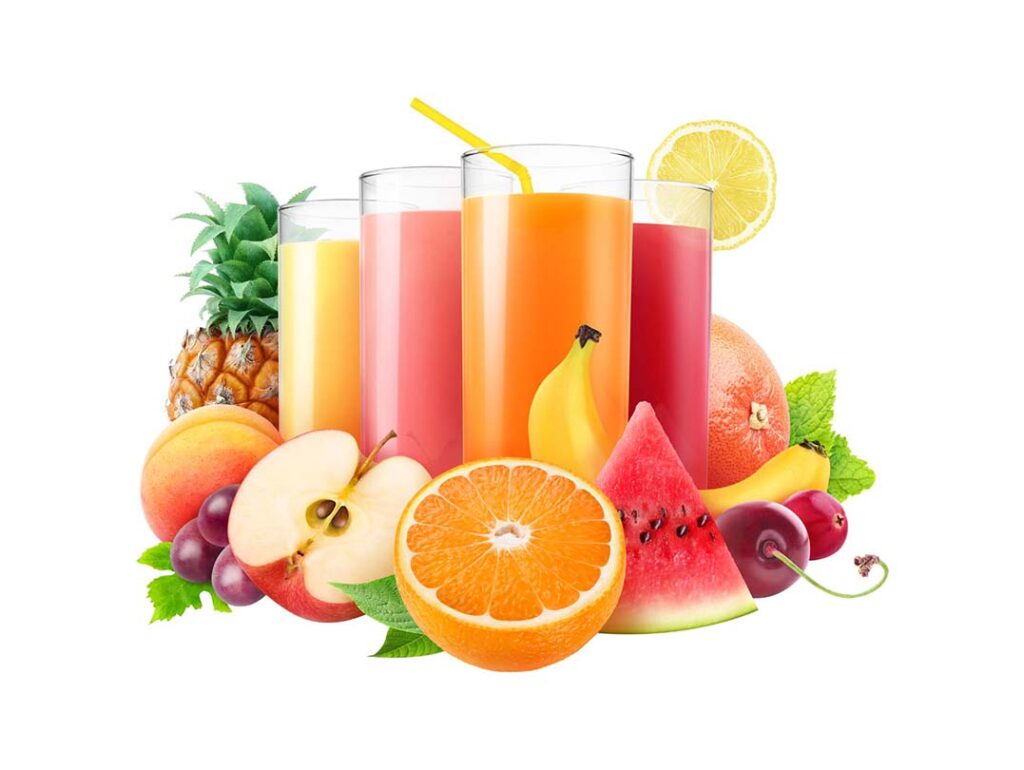
Peach juice:
Peach juice does not only bless our taste buds with sweet and fuzzy flavor but also incorporates a wealth of health benefits. So, let’s peel back the layers of this delicious fruit and embrace all its amazing facts. Some essential nutrients in peach juice are vitamin C, potassium, vitamin A, antioxidants, carotenoids, caffeic acid, and fiber.
Vitamin C helps build the immune system and improves skin health by boosting collagen levels, while the beta-carotene that gives the peaches a red-orange color is essential for eye health. The potassium in peach juice reduces the risk of heart disease by lowering blood pressure. Furthermore, certain compounds in peaches bind bile acids and remove them when cholesterol levels are high, thereby reducing their levels. Two compounds called carotenoids and caffeic acid in peaches reduce the risk of cancer, while polyphenols prevent cancer cells from growing. The soluble fiber in peach juice improves gut health by improving bowel movement and preventing constipation.
In addition, some peach juices may contain added sugar which may cause dental problems and weight gain upon excess consumption. People who are allergic to peaches may avoid consuming its juice as well. Peach juices can be used as a sweetener in numerous recipes including sauces, dressings, and desserts.
To summarize, peach juice is a nutrient-rich juice containing all essential minerals, vitamins, and antioxidants that play a huge role in maintaining overall health and well-being.
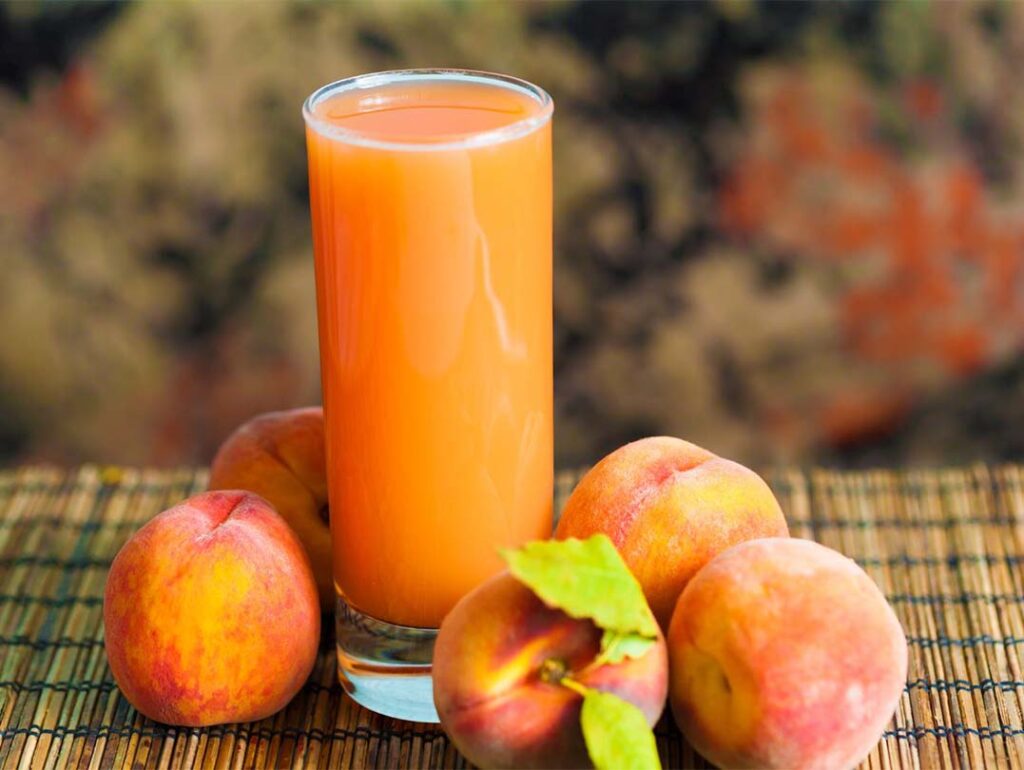
Nectarine juice:
In the flavorful world of juices, very few compete with the velvety texture and the nutritional potency of the nectarine juice. From its vitamin C content to its soluble fiber galore, a fresh glass of nectarine juice renders a plethora of nutrients.
The rich antioxidant potential of the nectarine juice reduces the symptoms of metabolic syndrome while reducing blood glucose and atherosclerosis. The polyphenols like anthocyanins prevent the accumulation of adipose cells around organs and reduce the risk of heart disease. Furthermore, polyphenols may also be protective against the development of breast cancer and may boost skin health owing to their anti-inflammatory and anti-bacterial properties. The high sugar content of the nectarine juice may cause weight gain upon excess consumption while people who are allergic to this fruit should avoid consuming its juice as well.
Overall, nectarine juice is highly beneficial when consumed as a part of a balanced diet owing to its rich nutrient profile that provides tons of health benefits. However, it’s essential to be mindful of the added sugars and the allergies associated with nectarine juice.

Plum juice:
Plum juice; a jewel among gems is a refreshing addition to the sea of juices that not only provides flavor but is packed with essential nutrients necessary for optimal health and well-being. Aside from the macronutrients, plums are a good source of vitamin C, K, potassium, copper, manganese, dietary fiber, and antioxidants.
The vitamin C in plum juice supports the immune system and slows down the aging process while the phytonutrients may help reduce the risk of development of cancer, heart diseases, aging, and neurodegeneration. The anthocyanins and potassium in plums may help manage blood pressure and cardiovascular complications. In addition, the vitamin K in plums is essential for blood clotting while also helping in bone health, especially in post-menopausal women. Furthermore, the antioxidants may reduce inflammation and oxidative stress while protecting against chronic diseases. The dietary fiber may improve digestive health by preventing constipation and promoting bowel movements.
Aside from their high sugar content and allergy issues, plum juice may cause digestive issues in people suffering from irritable bowel syndrome (IBS) such as gas, diarrhea, and bloating. Plum juice can be incorporated into everyday life by using it in smoothies, cocktails, mocktails, dressings, marinades, and salads. Additionally, plum juice can be consumed as a remedy for digestive issues and dehydration.
All in all, plum juice is considered a nutrient-rich beverage that not only provides hydration but also plays a role in maintaining overall health.
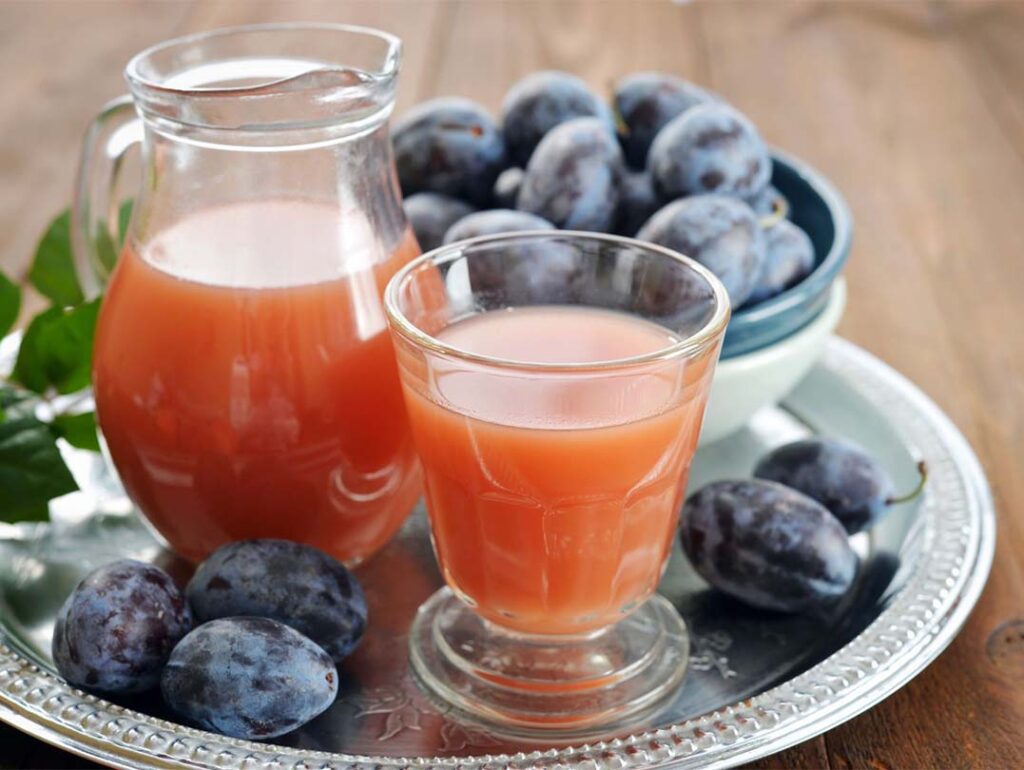
Apricot juice:
Let us step into the garden of apricots, where every drop of apricot juice gives a myriad of nutrients essential for the healthy maintenance of life. From its role in eye health to supporting the immune system, apricot juice emerges as nature’s gift.
Apricot juice is a rich source of vitamins C, and E, calcium, potassium, beta-carotene, and antioxidants. The beta carotene, vitamins A, C, and E act as antioxidants that not only reduce oxidative stress by neutralizing free radicals but also protect against major chronic diseases like diabetes and cardiovascular diseases. The vitamins A and E in the apricot juice also help improve eye vision; vitamin A prevents night blindness while vitamin E protects the eyes from free radicals damage. Additionally, vitamins A and C help improve skin health by protecting it from UV damage and preventing wrinkles. The soluble fiber in apricot juice may boost digestive health by preventing constipation and promoting bowel movements. The high potassium content of apricot juices regulates blood pressure and prevents cardiovascular disorders. What’s more, no major side effects apart from being high in added sugars or causing allergies have been observed in apricot juices.
It is easy to include apricot juice into your diet by drinking it on its own, adding it to cocktails, mocktails, and smoothies, or adding it to salad dressings, marinades, and desserts.
In the end, it is important to note that apricot juice is a delicious beverage packed with essential nutrients that have multiple health benefits ranging from eye health to digestive health. While they are highly essential for optimal health, be mindful of their sugar content as they may lead to diabetes and weight gain upon excess consumption.

Cherry juice:
The small, ruby red, round fruits produce a juice that is not only delicious but hides a rich amount of nutrients including vitamin C, K, iron, manganese, potassium, thiamine, and antioxidants.
Studies show that consuming cherries or their juice before, during, or after exercise may help reduce muscle damage and provide speedy recovery while the antioxidants such as anthocyanins that impart red color to the cherries prevent inflammation and improve oxidative damage. Furthermore, the anti-inflammatory and antioxidant properties of cherry juice reduce systolic blood pressure and LDL cholesterol along with preventing arthritis. The vitamin K in cherry juice is essential for blood clotting. Additionally, tart cherry juice contains melatonin, a sleep-regulatory hormone. Drinking cherry tart juice before sleeping can provide a good night’s sleep. Cherry tart juice can also reduce serum urate levels and prevent gout.
Apart from some cherry juices having a high added sugar content and allergens, no major side effects are known from consuming this juice. Incorporating it into your smoothies, cocktails, salads, dressings, and sauces is a great way to include cherry juice in your diet.
Overall, the red-hued cherry juice is a great addition to our balanced diet that not only hydrates the body but imparts essential health benefits.

Tropical fruit juices:
Tropical fruits hide a symphony of essential nutrients in addition to their rich flavor. From the sweetness of mangoes to the tanginess of pineapples and the jammy texture of Prunes, tropical fruits have a world of their own. But beyond their flavor, their juices conceal a treasure of beneficial vitamins, minerals, and phytochemicals. Let us discuss some of the nutrients found in these juices:
Vitamin C:
Similar to others, tropical fruit juices are also a good source of vitamin C responsible for strengthening immune function and preventing illnesses and infections.
Vitamin A:
Fruit juices like mangoes and papayas are excellent sources of vitamin A essential for vision and skin health.
Potassium:
Tropical fruit juices particularly mangoes and papayas contain a good amount of potassium that helps maintain blood pressure and prevent heart diseases.
Folate:
Papaya and guava juice in particular contain folate responsible for cell division and synthesis of DNA.
Calcium:
Tropical fruit juices may also contain calcium necessary for bone health.
Iron:
Among tropical fruit juices, guava juice contains iron essential for oxygen transport in the blood.

Now, let us go through all the tropical fruit juices and explore their nutrition one by one:
Pineapple juice:
Let us dive into the refreshing world of pineapple juice where each sip takes you on a journey full of nutrients. A glass of pineapple juice provides tons of nutrients including vitamin C, manganese, bromelain, copper, vitamins B1 and B6, and antioxidants.
Aside from pineapple juice providing hydration, the vitamin C in it strengthens the immune system and prevents illnesses alongside wound healing. The manganese in pineapple juice helps build strong bones and reduce the risk of osteoporosis while the bromelain, an enzyme that helps in digestion by breaking down protein reduces digestive tract inflammation, and gets rid of indigestion and bloating. Furthermore, the bromelain also helps reduce inflammation by treating arthritis and sports injuries. The bromelain has been studied to be effective in heart health by breaking down clots and reducing blood cholesterol levels. Although less in the juice than the whole pineapple, pineapple juice contains some amount of dietary fiber essential for gut health and regulating bowel movements.
In contrast, a large amount of pineapple juice may cause some digestive issues like diarrhea and abdominal pain due to its bromelain and high acidic content while some people may be allergic to pineapple and experience symptoms like itching, swelling, and hives upon consuming pineapple juice.
To summarize, pineapple juice is one great and nutritious addition to our balanced diet owing to all its nutrients and benefits that range from immune strengthening to digestive health.

Mango juice:
The vibrant yellow mangoes shine bright among the sea of tropical fruits that squeeze out the most luscious and nourishing juice captivating not only hearts but also taste buds. But beyond its rich taste, every sip of mango juice hides a plethora of vitamins and minerals waiting to benefit the body in various ways.
Mango juice is a rich source of vitamins C, A, and E, potassium, dietary fiber, polyphenols, B vitamins, copper, and folate. Vitamin C not only boosts the immune system but also helps improve skin health and prevent UV rays damage along with vitamin A that helps in eye vision as well.
The vitamin E content of the mango juice protects the cells from free radical damage and prevents oxidative stress. Potassium alongside magnesium reduces blood pressure and helps protect the heart. In addition, mango juice is filled with polyphenols that act as antioxidants and protect the body from developing chronic diseases including the cancers of colon, lung, prostate, and breast. Aside from allergies caused in some people and digestive issues upon large amounts of mango juice consumption, it does not cause serious harmful effects.
Overall, mango juice is a nutritious and flavorsome beverage that not only quenches our thirst and provides us hydration but also benefits our body in multiple ways.

Guava juice:
The amazingly delicious guava juice is not only rich in flavor but also in nutrients. This nutrient-abundant juice is high in vitamins C, and A, folate, potassium, antioxidants, and dietary fiber.
Guava juice is high in vitamin C which not only helps strengthen the immune system but also aids in collagen production and wound healing while the vitamin A in guava juice improves eye health and prevents eye-related disorders. Furthermore, the folate in the juice helps in cell division and DNA synthesis while the electrolyte mineral potassium regulates blood pressure, and muscle function, and supports heart health. The antioxidants and dietary fiber content of guava juice may be beneficial for diabetes as it reduces insulin resistance in diabetics. A trace mineral copper found in guava juice may help regulate the production and absorption of thyroid hormone in the body while the mineral magnesium acts as a muscle relaxant.
Aside from the high sugar content in some guava juices and allergic reactions, guava juice may cause some abdominal discomfort in people who consume large amounts of it. So, guava juice is a flavorful and nutritious addition to our everyday balanced diet with some essential health benefits to the body.
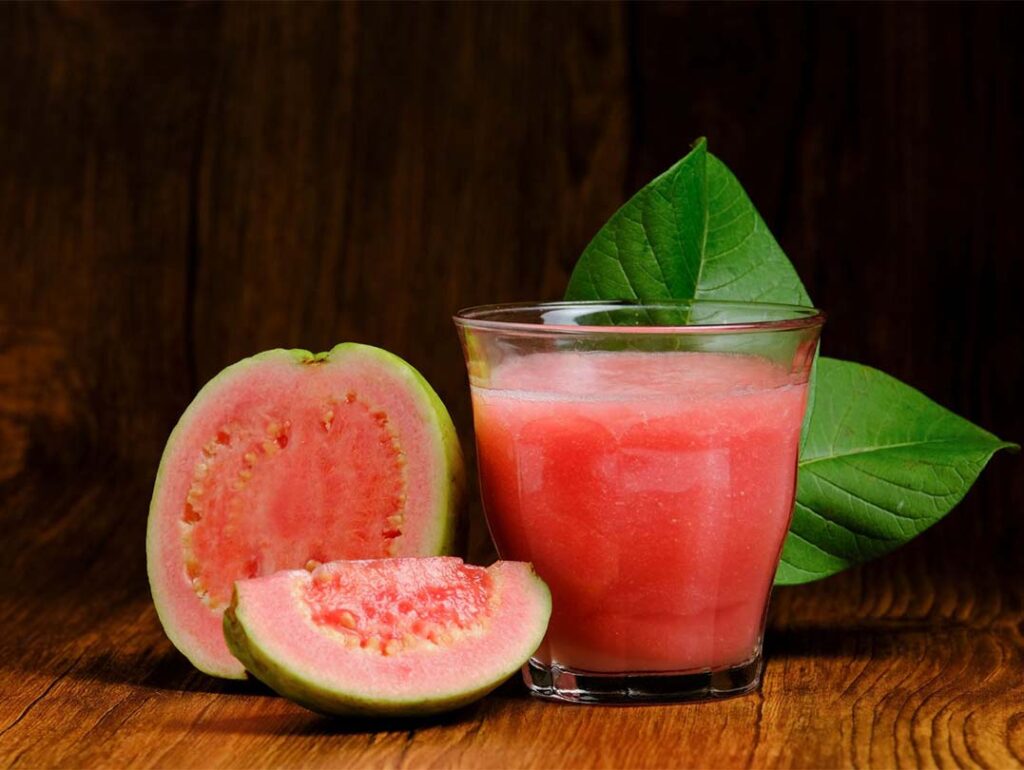
Papaya juice:
This smooth and thick textured juice stands out among the many juices owing to its vibrant orange and peach hue. But aside from its attractive color, it is also prominent due to the many essential nutrients present in a glass of papaya juice.
Some of the important nutrients available in papaya juice are vitamins C, A, and K folate, potassium, calcium, iron, dietary fiber, antioxidants, and papain. Vitamin A and an antioxidant in Papaya juice named zeaxanthin protect eye health and prevent macular degeneration. What’s more, papaya juice is home to several antioxidants aside such as carotenes and lycopenes that help prevent asthma in adults as well as cancer. Papaya juice is a good source of vitamin K that helps in bone health by improving calcium absorption. The potassium and antioxidant content may reduce blood pressure and strengthen cardiovascular health. In addition to dietary fiber, an enzyme found in papaya juice called papain aids in digestive health and has anti-inflammatory properties.
Apart from their causing digestive disturbances and allergies, a high intake of unripe papaya juice is not recommended for pregnant females due to the risk of uterine contractions. Papaya juice can be added to our everyday life as beverages, in cooking as well as in skin treatments due to its high vitamin C content.
All in all, a glass of papaya juice can be a great addition to our everyday balanced diet due to its nutrient-rich profile.
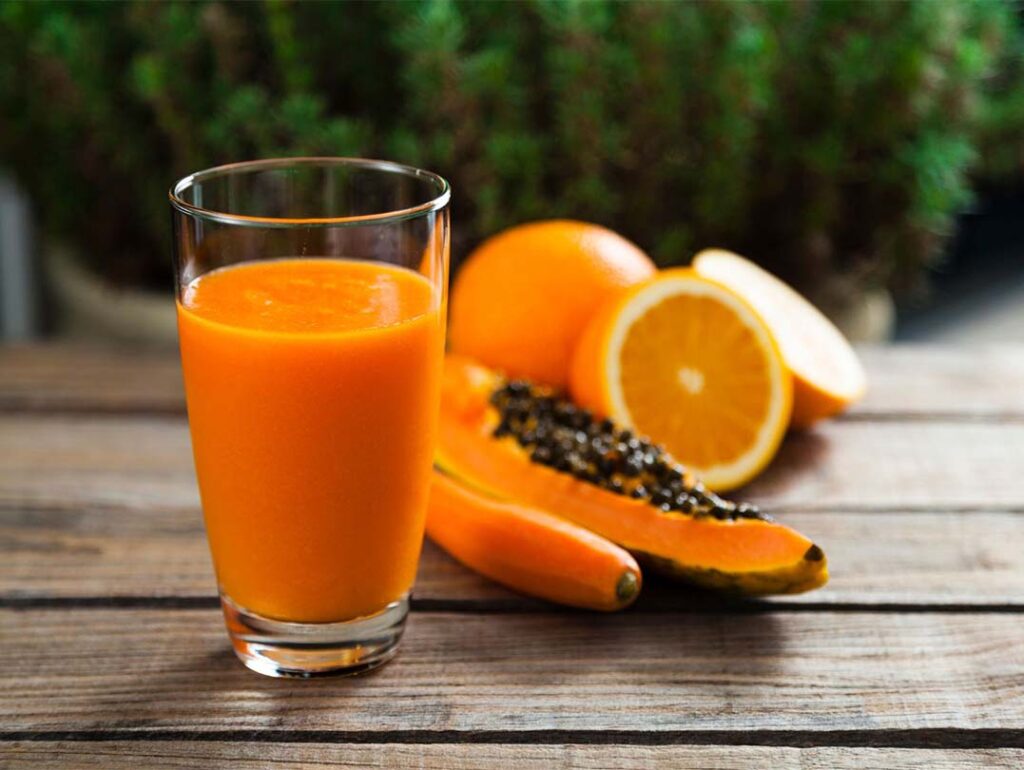
Passion fruit juice:
Another topical fruit, passion fruit makes a vibrant and refreshing juice that flows with vital nutrients ready to benefit the body in various ways.
Some of the nutrients in passion fruit juice are vitamin C, A, vitamin B6, iron, potassium, calcium, magnesium, dietary fiber, and antioxidants. The vitamin C content of passion fruit juice strengthens the immune system and improves skin health alongside wound healing. The vitamin A of the juice is beneficial for eye health as well as hair, skin, and mucous membranes of the body. The antioxidants in passion fruit juice may not only reduce inflammation but also protect the body from free radicals.
Some people may develop allergies to passion fruit and its juice so one should limit their consumption. Apart from that digestive discomfort may be experienced in some individuals upon large intake of passion fruit juice. All in all, adding this refreshing juice into our everyday life may not only enhance our taste buds but also contribute to overall health and well-being.

Prune juice:
Among the tropical fruits galore, the less-known prune juice is as beneficial as others. Derived from dried prunes, this juice offers a myriad of health benefits.
Some of the beneficial nutrients present in prune juice are potassium, vitamins A, K, B6, and B3, sorbitol, dietary fiber, and antioxidants. Prune juice is high in dietary fiber and sorbitol, a sugar alcohol that draws water into the intestines, helping to improve digestive health including relieving constipation. The presence of vitamin K in prune juice aids in maintaining bone health and reduces the risk of osteoporosis. Moreover, potassium aids in regulating blood pressure and strengthening cardiovascular health while the antioxidants prevent oxidative stress by neutralizing free radicals and reducing inflammation in the body. Prune juice is a low-calorie high-fiber juice, thus may aid in maintaining weight.
Apart from allergies associated with prune juice and digestive issues, no adverse side effects have been associated with prune juice. Overall, prune juice is not just a refreshing but also a nutritious addition to our everyday life responsible for contributing to our health.

Berry juices:
The berry juices are not only colorfully attractive and delicious but are also packed with nutrients. Each berry with its conclusive flavor and nutrient profile makes it a popular choice for health-conscious people. Imagine a sip of berry juices not only refreshes and hydrates you but also enhances your daily diet. Let us discuss some of the important nutrients found in berry juices:
Vitamin C:
Apart from macronutrients, one cup serving of berry juice provides 24% of the total recommended intake of vitamin C.
Vitamin K:
Berry juice renders 26% of the total recommended daily intake of vitamin K from one sup serving important for blood clotting.
Antioxidants:
Berry juices are packed with antioxidants including anthocyanins in blueberries and raspberries, quercetin in blackberries, and ellagic acid in strawberries. The antioxidants fight against free radicals and prevent the body from oxidative stress and inflammation.
Folate:
Strawberry and raspberry juices contain folate necessary for DNA synthesis and cell division, particularly in pregnancy.
Potassium:
Mainly found in blackberries and blueberries, potassium is an electrolyte mineral that helps control blood pressure.
Dietary fiber:
Among berries, raspberry, and blackberry juices are high in dietary fiber that not only improves digestive health but also regulates blood sugar levels.
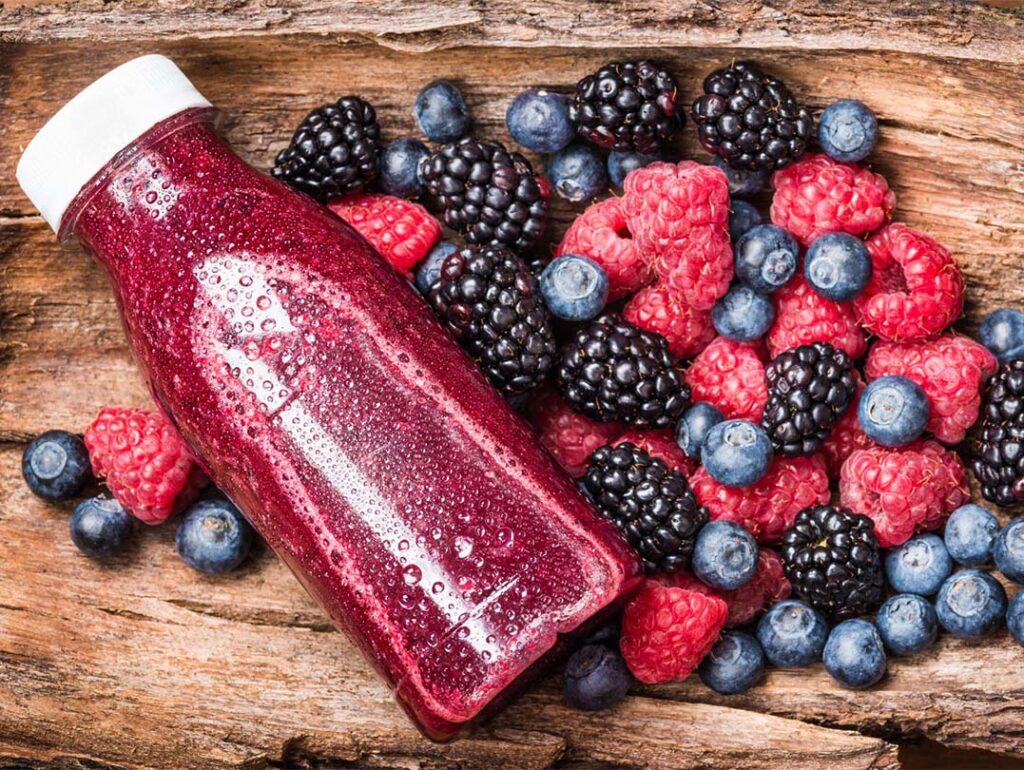
Now, let us overview some of the important berry juices and explore the nutrients and their role in human nutrition.
Grape juice:
Grape juice is a drink that not only tantalizes your taste buds but is also a powerhouse of nutrients that renders a burst of nutrients in every sip. Some of the nutrients present in grape juice are vitamin C, K, B-complex, potassium, magnesium, manganese, copper, and antioxidants.
Owing to its high antioxidant (flavonoids) content, grape juice reduces the risk of cardiovascular diseases by lowering inflammation, plaque build-up in arteries, and cholesterol levels. Similarly, potassium also aids in cardiovascular health by regulating the blood pressure. The vitamin C not only strengthens the immune system but also promotes wound healing and skin health. Although less than the amount of dietary fiber in whole grapes, grape juice still contains substantial amounts of dietary fiber that promotes healthy digestive systems and bowel movements. Lastly, the vitamin K in grape juice helps in bone health along with blood clotting.
The high natural sugar content of grape juice may lead to weight gain and diabetes type 2 upon large consumption. Excessive consumption of grape juice may also cause digestive discomfort like bloating and diarrhea.
While grape juice is a rich source of nutrients and provides tons of health benefits, it is advisable to consume it in moderation to achieve the highest amount of its gains.

Cranberry juice:
The vibrant red-colored and tart-flavored cranberry juice made from tiny North American cranberries is a beloved beverage not just for its taste but also for its nutrient-rich profile. Vitamin C, K, E, potassium, manganese, and antioxidants are some of the nutrients found in cranberry juice.
Antioxidants called proanthocyanidins reduce the risk of urinary tract infections (UTIs) by stopping the bacteria from reaching the walls of the urinary bladder. Furthermore, the vitamin C-rich content of cranberry juice strengthens the immune system and prevents inflammation. While vitamin K aids in blood clotting, vitamin E acts as an antioxidant and protects the cells from damage by neutralizing free radicals. Furthermore, cranberry juice also aids in digestive and dental health and reduces the risk of gum diseases and cavities.
Apart from high sugar content and allergic reactions, cranberry juice is high in oxalates which may lead to kidney stones upon frequent consumption. Hence, cranberry juice is a nutrient-rich beverage that benefits in many ways ranging from UTIs to oral health.
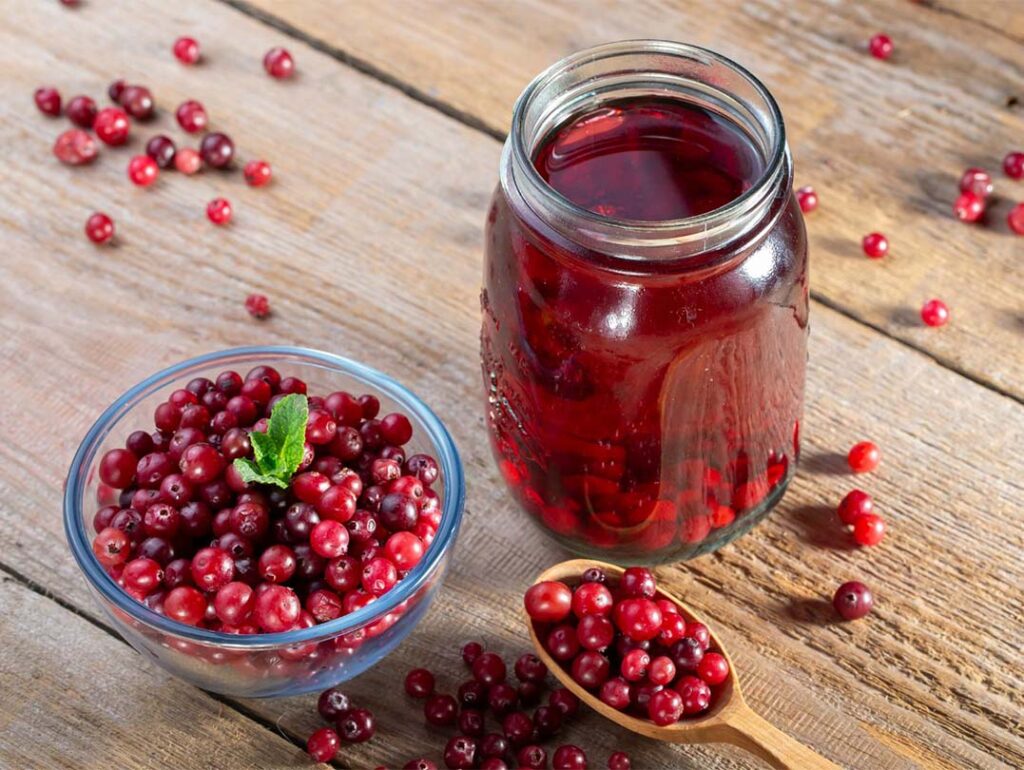
Blueberry juice:
Blueberry juice; a beloved beverage extracted from the tiny nutrient-packed blueberries hiding among them a plethora of nutrients. Vitamin C, K, E, potassium, manganese, and antioxidants are some of the nutrients found in blueberry juices.
Anthocyanins, an antioxidant in blueberry juice improve brain health and prevent neurodegenerative disorders. Potassium along with antioxidants regulates blood pressure and improves cardiovascular health while vitamin C fights off free radicals protects the immune system and prevents inflammation. Blueberries have also been found to be protective in preventing urinary tract infections (UTIs). Aside from its high sugar content that may cause weight gain upon large consumption, some other side effects associated with blueberry juice intake are digestive disturbances and allergies in some people.
Hence, from brain-boosting benefits to immune function, blueberry juice can provide a variety of benefits to the body if consumed in moderation.

Raspberry juice:
Raspberry juice, rejoiced for its nutrient-rich profile hides a myriad of nutrients among its plump layers. Filled with vitamins, minerals, and antioxidants a glass of raspberry juice aids in living a healthy life. Some of the nutrients in raspberry juice are vitamin C, K, and B vitamins, magnesium, phosphorus, iron, potassium, copper, manganese, dietary fiber, and antioxidants.
The vitamin C in raspberry protects the immune system and prevents inflammation. Raspberry juice is high in antioxidants that protect against oxidative stress reducing the risk of cancer, diabetes, heart disease, and other chronic diseases. The low-carb and high fiber content of raspberry juice is beneficial for diabetes and berries generally have low glycemic index. Raspberries have also been studied for their beneficial effects on arthritis and weight loss. Furthermore, the high antioxidant content of raspberry juice may reduce the signs of aging by neutralizing free radicals. Some side effects associated with consuming raspberry juice are allergic reactions and digestive disturbances like gas and diarrhea.
In the end, raspberry juice is a delicious and nutritious addition to our everyday diet due to its health-promoting compounds.
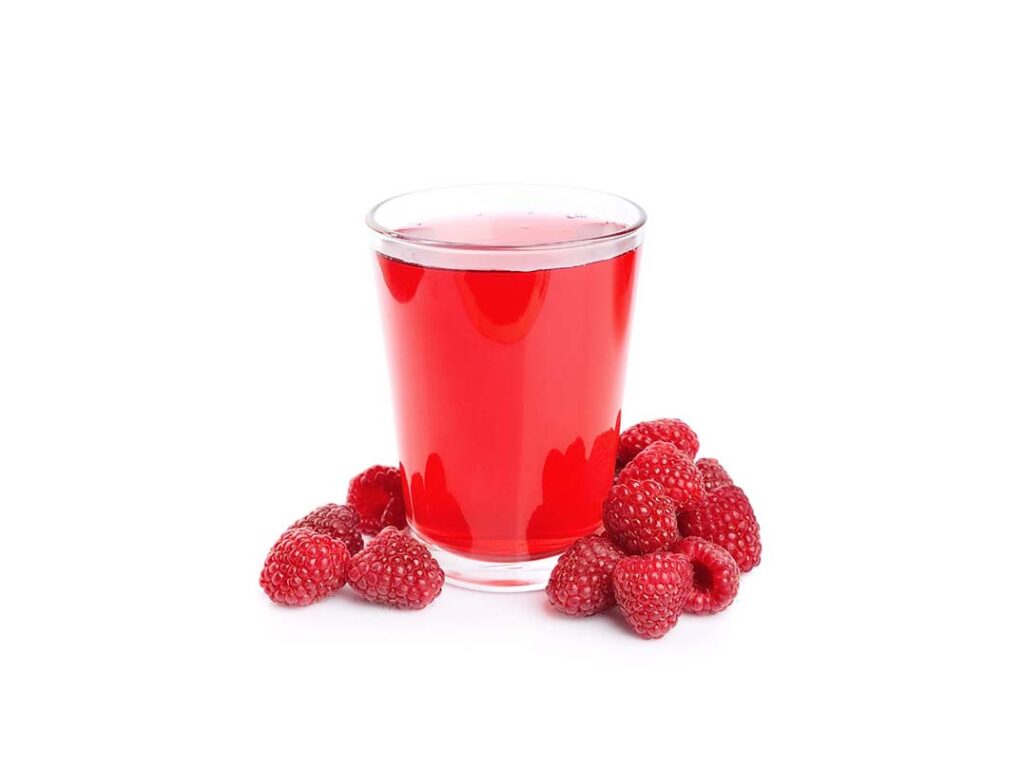
Blackberry juice:
The deep-purple-colored sweet and tart-flavored blackberries turn into a glass of refreshing juice that provides a burst of nutrients in every sip. Packed with all essential nutrients including vitamins C, and K, manganese, dietary fiber, calcium, potassium, magnesium, phosphorus, and some B vitamins, blackberry juice is ready to deliver its best in terms of health benefits.
Potassium, antioxidants, and fiber aid in improving cardiovascular health by reducing blood pressure and reducing blood cholesterol levels. Vitamin K in blackberry juice aids in blood clotting and bone health while manganese helps in energy production, bone growth, and reproduction. The polyphenols such as anthocyanins reduce inflammation by preventing oxidative stress and neutralizing free radicals.
Anthocyanins also have a role in brain health as they increase blood flow to the brain and improve memory and speech in people with dementia. Ellagic acid along with antioxidants also helps promote skin elasticity and protect against UV damage. Aside from allergic reactions in some people and gastrointestinal symptoms, no such adverse effects have been observed with consuming blackberry juice.
In the end, blackberry juice offers a refreshing taste as well as numerous nutrients that are beneficial for the sustenance of a healthy life.
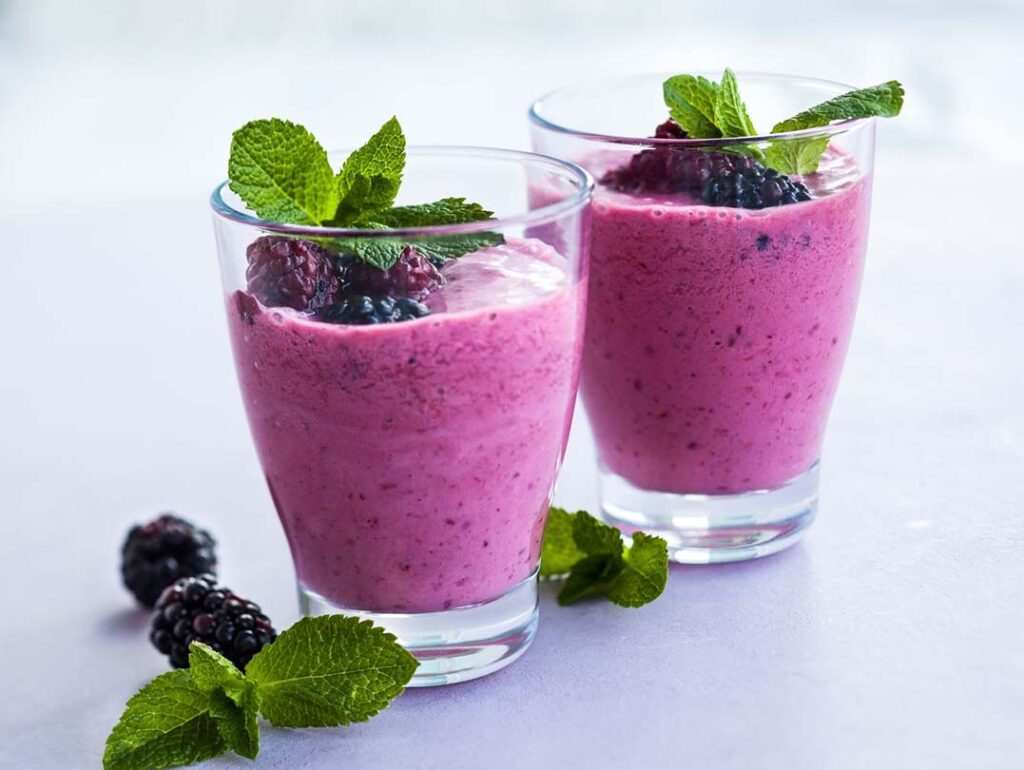
Strawberry juice:
Every tiny strawberry produces a juice that is not only delicious but imparts a burst of nutrients that benefit the body in various ways. Let’s learn a little about the nutritional richness of strawberry juice and how incorporating it into our diet can contribute to a healthier life.
Rich in vitamin C, A, K, potassium, magnesium, manganese, folate, copper, phosphorus, antioxidants, and dietary fiber a single glass of strawberry juice imparts tons of nutrients. Vitamin C acts as an antioxidant and supports the immune system and wound healing. Strawberry juice may also be beneficial for heart health owing to the presence of potassium and certain antioxidants like anthocyanins by regulating blood pressure and reducing LDL cholesterol. The antioxidants in strawberry juice may also have the ability to fight off free radicals and reduce inflammation thereby preventing the body from developing certain cancers. Strawberry juice may also benefit bone health due to the presence of phosphorus and magnesium while the B vitamins are essential for metabolic activity and energy production.
Some people may experience allergic reactions from consuming strawberry juice because it contains histamines; chemical compounds that trigger allergic reactions in the body. The high fiber content of strawberries can cause gastrointestinal problems upon large consumption.
Conclusively, strawberry juice is a good addition to our everyday diet due to its abundance of nutrients and its health benefits.

Other fruit juices:
Let us finally discuss some other fruit juices and their nutrition as they are as essential for us in our everyday lives:
Watermelon juice:
A summertime favorite that not only cools off heat but is also packed with vital nutrients that are essential for health and well-being. Imagine sipping on a glass of fresh watermelon juice that is not only hydrating but also imparts a burst of nutrients including vitamins A, C, B5, B6, potassium, copper, magnesium, water, lycopene, and citrulline.
Due to its high water content, watermelon juice provides hydration on a hot summer day. The mineral potassium regulates blood pressure and improves heart health citrulline (an amino acid converted into arginine in the body) aids in nitric oxide production that relaxes and dilates the muscles around the blood vessels, thus aiding in reduced blood pressure.
Moreover, the vitamin C-rich content of the watermelon juice not only aids in immunity boosting but also helps in collagen synthesis. Lycopene, an antioxidant in watermelon that gives it its red color prevents the body from developing certain cancers and other diseases.
Apart from its high sugar content that may lead to weight gain and diabetes upon frequent composition, some people may experience bloating, diarrhea, and other digestive disturbances due to its high water and dietary fiber content.
Overall, while watermelon juice keeps the body hydrated, it also serves as a great provider of many important nutrients necessary for the healthy maintenance of life.

Apple juice:
The naturally sweet and refreshing apple juice is filled with a variety of vital nutrients essential for a healthy life. Some of the nutrients available in apple juice include vitamins A, C, B-complex, potassium, calcium, and antioxidants like flavonoids and polyphenols.
The vitamin C content in apple juice aids in immune strengthening and wound healing while the vitamin A helps in vision health. Apple juice is beneficial for diabetes as it does not increase blood sugar levels after consumption. Furthermore, the antioxidants including flavonoids and polyphenols reduce oxidative stress and inflammation by minimizing free radicals. At the same time, these antioxidants also help prevent the formation of cancer cells in the body. The polyphenol content of apple juice may also aid in protecting the brain and reducing the symptoms of anxiety and restlessness.
Aside from the high sugar content in some apple juices, digestive discomfort from consuming too much, and allergies associated with it in some people, apple juice does not cause other serious side effects upon consumption. Apple juice can be used in beverages, cooking, baking, smoothies, and cocktails to render all of its benefits. So, apple juice is not just a delicious drink but also a nutritious beverage that aids the body in several ways ranging from as small as skin health to as big as cancer protection.

Pear juice:
The subtle yet sweet flavor of pear juice is abundant in beneficial nutrients ready to benefit the body in various ways. Rich in vitamins C, and K, dietary fiber, potassium, copper, calcium, magnesium, some vitamin Bs, and antioxidants, this simple yet nutritious and refreshing juice nurtures our daily diet.
The vitamin C of pear juice aids in immune strengthening and wound healing. Also, vitamins C and K act as antioxidants and fight off inflammation reducing the risk of type 2 diabetes and heart diseases. Furthermore, the anthocyanins in red pear juice strengthen the blood vessels and protect the heart along with potassium, a mineral that regulates blood pressure and supports cardiovascular health. The anthocyanins and cinnamic acid in pear juice fight the cancers of the stomach, bladder, and lungs. Pear juice contains both calcium and magnesium necessary for bone health and preventing osteoporosis. It also promotes blood clotting owing to the presence of vitamin K and may help protect brain health due to copper in pear juice.
Pear juices are high in natural sugars that may lead to weight gain upon a large amount of consumption. People allergic to pears should avoid consuming its juice as well and it may also cause digestive discomfort upon large consumption. In the end, pear juice is a nutritious and refreshing beverage that may aid the body in various ways upon frequent consumption.

Tomato juice:
The red-hued and savory tomato juice is not only a staple in the kitchen but is enjoyed for its taste and benefits around the world. A fresh glass of tomato juice is packed full of vitamins, minerals, and antioxidants waiting to be savored.
Tomato juice is rich in vitamins C, A, K, and B vitamins, lycopene, folate, potassium, copper, and magnesium. The vitamin C in tomato juice strengthens the immune system and promotes wound healing as well as improves skin. Beta-carotene, a precursor converted into vitamin A is vital for vision health and skin health. Potassium, an electrolyte mineral lowers blood pressure and protects cardiovascular health. Lycopene, a carotenoid pigment responsible for imparting tomato its red color, fights off free radicals and reduces inflammation. Studies also suggest a positive role of lycopene in reducing blood cholesterol levels as well as reducing the risk of many chronic diseases including cancers. Magnesium not only supports nerve and muscle function but also improves bone health. Furthermore, vitamin K in tomato juice aids in blood clotting and prevents bleeding problems.
Apart from allergic reactions, tomato juice is acidic and may cause acid reflux in people with gastroesophageal reflux disease (GERD). In the end, tomato juice is not just a culinary ingredient but also a nutritious beverage that imparts numerous health benefits necessary for maintaining a healthy life.

Conclusion:
In conclusion, fruit juices can be a delicious yet efficient way to incorporate important nutrients into our diet as they offer a wide range of vitamins, minerals, and antioxidants each working hard to maintain and healthy life. From their role in building the immune system to their effects on the skin, from their impact on blood sugar to their benefits in bone health, fruit juices have got it all. One key component in consuming fruit juices is variety!
Choosing fruit juices from different groups and incorporating them into our everyday diet is a way to benefit from the unique health benefits of all fruits. By enjoying fruit juices as a part of our everyday diet can we harness their nutrients and the numerous health benefits associated with them. So, let’s unlock the pleasures of fruit juices that fuel our health and well-being with every drop!






